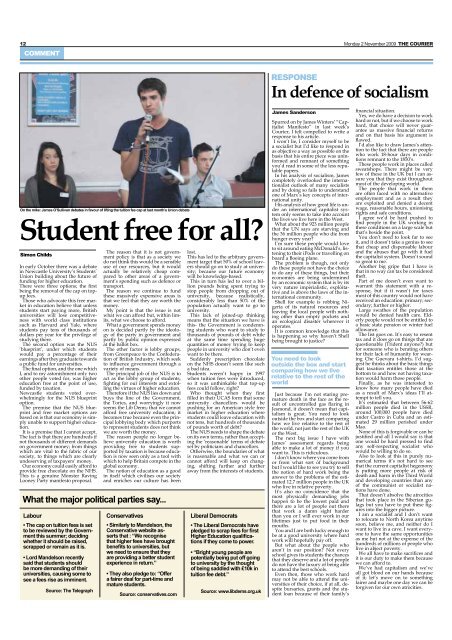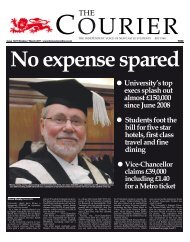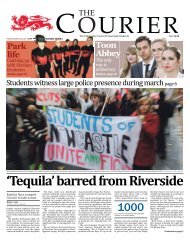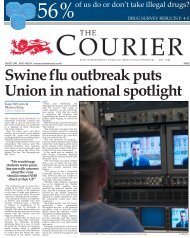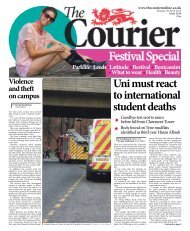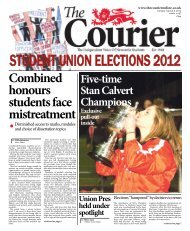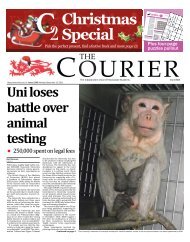2nd November (Issue 1197) - The Courier
2nd November (Issue 1197) - The Courier
2nd November (Issue 1197) - The Courier
You also want an ePaper? Increase the reach of your titles
YUMPU automatically turns print PDFs into web optimized ePapers that Google loves.
12 Monday 2 <strong>November</strong> 2009 THE COURIERCOMMENTOn the mike: James O’Sullivan debates in favour of lifting the tuition fee cap at last month’s Union debateStudent free for all?Simon ChildsIn early October there was a debatein Newcastle University’s Students’Union building about the future offunding for higher education. being the removal of the cap on topupfees.Those who advocate this free marketin education believe that unlessstudents start paying more, Britishuniversities will lose competitivenesswith world class institutionssuch as Harvard and Yale, wherestudents pay tens of thousands ofdollars per year for the privilege ofstudying there.<strong>The</strong> second option was the NUS‘blueprint’, under which studentswould pay a percentage of theirearnings after they graduate towardsa public fund for universities.I, and to my astonishment only twoother people voted for, was highereducation free at the point of use,funded by taxation.Newcastle students voted overwhelminglyfor the NUS blueprintoption.<strong>The</strong> premise that the NUS blueprintand free market options arebased on is that our economy is simplyunable to support higher education.It is a premise that I cannot accept.<strong>The</strong> fact is that there are hundreds ifnot thousands of different demandson government money; from thingswhich are vital to the fabric of oursociety, to things which are clearlyundeserving of taxpayers’ money.Our economy could easily afford toprovide free chocolate on the NHS.This is a genuine Monster RavingLooney Party manifesto proposal.<strong>The</strong> reason that it is not governmentpolicy is that as a society wedo not think this would be a sensibleuse of our resources, but it wouldactually be relatively cheap comparedto other areas of a government’sspending such as defence ortransport.<strong>The</strong> reason we continue to fundthese massively expensive areas isthat we feel that they are worth themoney.My point is that the issue is notwhat we can afford but, within limits,what we choose to afford.What a government spends moneyon is decided partly by the ideologyof the party in government andpartly by public opinion expressedat the ballot box.<strong>The</strong> other factor is lobby groups,from Greenpeace to the Confederationof British Industry, which seek variety of means.<strong>The</strong> principal job of the NUS is toact as the lobby group of students,lingthe virtues of higher education.<strong>The</strong>refore if the NUS lies down andbuys the line of the Government,the Tories, and worryingly it nowseems the Lib Dems; that we cannotafford free university education; itbecomes true because even the principallobbying body which purportsto represent students does not thinkwe are worth the money.<strong>The</strong> reason people no longer believeuniversity education is worthproviding free to students supportedby taxation is because educationis now seen only as a tool withwhich to help Britain compete in theglobal economy.<strong>The</strong> notion of education as a goodin itself which civilises our societyand enriches our culture has beenWhat the major political parties say...lost.This has led to the arbitrary governmenttarget that 50% of school leaversshould go on to study at university;because our future economywill be knowledge-based.This in turn has led to over a billionpounds being spent trying tostop people from dropping out ofuniversity, because realistically,considerably less than 50% of thepopulation actually want to go touniversity.This lack of joined-up thinkingmeans that the situation we have isthis- the Government is condemningstudents who want to study tothousands of pounds of debt whileat the same time spending hugequantities of money trying to keeppeople in university who don’t evenwant to be there.Suddenly prescription chocolateon the NHS doesn’t seem like sucha bad idea.Students weren’t happy in 1997when tuition fees were introduced,so it was unthinkable that top-upfees could follow, right? university chancellors would bemarket in higher education wherestudents could leave education withnot tens, but hundreds of thousandsof pounds worth of debt?<strong>The</strong> NUS needs to shape the debateon its own terms, rather than acceptingthe ‘reasonable’ terms of debateset by politicians and chancellors.Otherwise, the boundaries of whatis reasonable and what we can orcannot afford will keep on changing,shifting further and furtheraway from the interests of students. Conservatives to be reviewed by the Governmentthis summer; decidingwhether it should be raised,scrapped or remain as it is.said that students shouldbe more demanding of theiruniversities, causing some tosee a fees rise as imminent.Conservative website assertsthat : “We recognisethat higher fees have broughtwe need to ensure that theyare providing a better studentexperience in return.”a fairer deal for part-time andmature students.Source: conservatives.comtionsif they come to power.potentially being put off goingto university by the thoughtof being saddled with £10k intuition fee debt.”Source: www.libdems.org.ukRESPONSEIn defence of socialismJames SandersonSpurred on by James Winters’ “CapitalistManifesto” in last week’s<strong>Courier</strong>, I felt compelled to write aresponse to his article.I won’t lie, I consider myself to bea socialist but I’d like to respond inas objective a way as possible on thebasis that his entire piece was uninformedand remnant of somethingyou’d read in some of the less reputablepapers.In his analysis of socialism, Jamescompletely overlooked the internationalistoutlook of many socialistsand by doing so fails to understandone of Marx’s key concepts of internationalunity.His analysis of how great life is underan international capitalist systemonly seems to take into accountthe lives we live here in the West.What about the 923 million peoplethat the UN says are starving andthe 36 million people who die fromhunger every year?I’m sure these people would loveto sit around eating McDonald’s, listeningto their iPods or travelling onboard a Boeing plane.<strong>The</strong> problem is though, not onlydo these people not have the choiceto do any of these things, but theireconomies are being underminedby an economic system that is by itsvery nature imperialistic, exploitativeand is above the laws of the internationalcommunity.Shell for example is robbing Nigeriaof its natural resources andleaving the local people with nothingother than empty pockets andan ecological disaster wherever itoperates.It is common knowledge that thisis happening so why haven’t Shellbeing brought to justice?You need to lookoutside the box and startcomparing how we liverelative to the rest of theworldJust because I’m not staring prematuredeath in the face as the re- Jesmond, it doesn’t mean that capitalismis great. You need to lookoutside the box and start comparinghow we live relative to the rest ofthe world, not just the rest of the UKor the West.<strong>The</strong> next big issue I have withJames’ assessment regards beingable to make a lot of money if youwant to. This is ridiculous.I don’t know where you come fromor from what sort of backgroundbut I would like to see you try to sellthe notion of hard work being theanswer to the problems of the estimated12.7 million people in the UKwho live in relative poverty.It’s also no coincidence that themost physically demanding jobshappen to be the lowest paid andthere are a lot of people out therethat work a damn sight harderthan you or I will ever work in ourlifetimes just to put food in theirmouths.You and I are both lucky enough tobe at a good university where hardwork will hopefully pay off.But what about the people whoaren’t in our position? Not everyschool gives its students the chancesthat they deserve and a lot of peopledo not have the luxury of being ableto attend the best schools.Even then, those who work hardmay not be able to attend the universitiesof their choice, if at all, despitebursaries, grants and the studentloan because of their family’sYes, we do have a decision to workhard or not, but if we choose to workhard, that choice will never guar- and on that basis his argument isI’d also like to draw James’s attentionto the fact that there are peoplewho work 18-hour days in conditionsremnant to the 1850’s.<strong>The</strong>se people work in places calledsweatshops. <strong>The</strong>re might be veryfew of these in the UK but I can assureyou that they exist throughoutmost of the developing world.<strong>The</strong> people that work in themare often faced with no alternativeemployment and as a result theyare exploited and denied a decentwage, reasonable hours, unionisingrights and safe conditions.I agree we’d be hard pushed to these conditions on a large scale butthat’s beside the point.You don’t need to look far to seeit, and it doesn’t take a genius to seethat cheap and dispensable labourand the abuses that go with it fuelthe capitalist system. Doesn’t soundso great to me. that in no way can tax be consideredtheft.Part of me doesn’t even want towarrant this statement with a response,but if it wasn’t for taxesmost of this country would not havereceived an education: primary; secondary;further or higher.Large swathes of the populationwould be denied health care. Elderlypeople would not be entitled toa basic state pension or winter fuelallowance.<strong>The</strong> list goes on. It’s easy to resenttax and it does go on things that arequestionable (Trident anyone?) butfor someone who is berating othersfor their lack of humanity for wearingChe Guevara t-shirts, I’d suggesthe thinks about the basic thingsthat taxation entitles those at thebottom to and how not having taxationwould harm those people.Finally, as he was interested toknow how many people have diedas a result of Marx’s ideas I’ll attemptto tell you.It’s estimated that between 56-62million people died in the USSR,around 100,000 people have diedunder Castro in Cuba and an estimated29 million perished underMao.None of this is forgivable or can beany self-respecting socialist whowould be willing to do so. mericalterms it’s not hard to seethat the current capitalist hegemonyis putting more people at risk ofdeath and harm in the Third Worldand developing countries than anyof the communist or socialist nationshave done.That doesn’t absolve the atrocitiesthat took place in the Siberian gu-uresinto the bigger picture.I am a socialist and I don’t wantto relocate to North Korea anytimesoon, believe me, and neither do Iwant to live in a cave. I want everyoneto have the same opportunitiesas me but not at the expense of thehundreds of millions of people wholive in abject poverty.it is our duty to make them becausewe can afford to.We’ve had capitalism and we’veall got blood on our hands becauseof it; let’s move on to somethingfairer and maybe one day we can beforgiven for our own atrocities.


